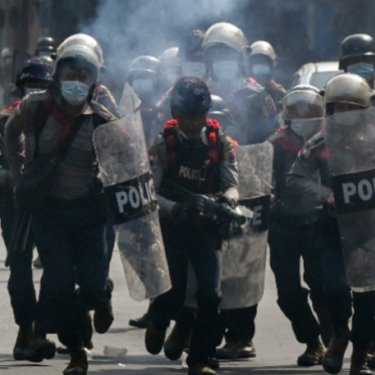Myanmar’s military junta eliminates independent media

Reporters Without Borders (RSF) calls for the restoration of media pluralism and unrestricted Internet access in Myanmar, where the military, in the weeks since staging a coup d’état on 1 February, have reasserted full control over news and information – engineering the disappearance of the last independent newspapers and imposing tight curbs on online access.
There is no longer a free press in Myanmar. The only print media have been official newspapers controlled by the military since 17 March, after the last independent daily in circulation, The Standard Time (San Taw Chain in Burmese), took the same decision as its four rivals and suspended its print edition, citing distribution problems since the coup.
Ten days after the information ministry told media to stop using the terms “junta” and “coup d’état” or face sanctions, the Myanmar Times suddenly suspended operations on 21 February “for three months,” according to the welcome message on its website. The website of the newspaper The Voice has not been updated since 1 March.
The military had to use stronger pressure to get two other newspapers, 7 Day News and Eleven, to stop publishing. It was only after the military authorities rescinded their licences on 8 March that they resigned themselves to stop publishing. The Eleven group nonetheless continues to post news on its website.
News access endangered
The military authorities have meanwhile been carrying our raids and equipment seizures – on 8 March at the offices of the Myanmar Now news agency and then, the next day, at the offices of the Mizzima News multimedia news group and the Kamayut Media video news website. The latter’s licence was not rescinded but two of its executives, Nathan Maung and Han Thar Nyein, have been arrested, preventing it from continuing to operate.
Legal proceedings were initiated against the online media The Irrawaddy on 14 March under article 505 (a) of the penal code. This article has often been used to convict journalists critical of the military but this is the first time that an entire news organisation has been targeted. Ten journalists are currently facing up to three years in prison for covering the street protests against the coup.
Other journalists have been the targets of reprisals for covering the protests against the military government. Two were abducted on 19 March while following the trial of Win Htein, one of the leaders of the National League for Democracy (NLD), the party whose government was brought down by the coup.
One of the two, BBC correspondent Aung Thura, was released on 22 March after three days of interrogation and sleep deprivation. Like other reporters, he had to sign an undertaking to stop covering the events taking place in Myanmar. The other, Mizzima News journalist Than Htike Aung, is still being held. Of the at least 45 journalists arrested since the coup, 25 have been released. The others are still held.
Finally, the military authorities are now imposing drastic restrictions on access to the Internet, which was the only way to see reliable, independent reporting. Fixed-line Internet is disconnected every night, mobile Internet has been blocked for the past 11 days, and access to public Wi-Fi networks has been reduced for the past week, according to the Internet freedom watchdog NetBlocks.
“The actions taken by the military junta to eliminate news pluralism and press freedom and to persecute those journalists trying against all odds to keep working have unfortunately succeeded and access to news and information has not been in such danger in Myanmar since its democratisation in 2011,” RSF editor-in-chief Pauline Adès-Mével said.
“After targeting the newspapers, the military authorities led by Gen. Min Aung Hlaing are now blocking the digital domain in order to prevent Myanmar’s people from keeping informed about the military’s bloody crackdown on demonstrators. We urge them to immediately restore press freedom, restore Internet networks and stop targeting the journalists still daring to report in the field.”
Hide or flee
Thein Zaw, an Associated Press journalist held for more than three weeks, was finally released yesterday after charges were dropped against him. He had been violently arrested while photographing policemen during a demonstration on 27 February. Robert Bociaga, a Polish photo-journalist arrested nearly two weeks ago, was also released yesterday and is awaiting deportation.
The only solution envisaged by most journalists to avoid arrest and police violence is to hide or flee to the remotest regions. According to The Irrawaddy, hundreds of journalists have chosen one or other of these options and, despite all the problems, some are continuing to work. Others have fled to regions that are rebel strongholds, such as the eastern state of Karen.
Last week, RSF referred the military crackdown on media and journalists to the UN special rapporteurs on the human rights situation in Myanmar and on the promotion and protection of the right to freedom of opinion and expression.
Myanmar is ranked 139th out of 180 countries in RSF's 2020 World Press Freedom Index.



